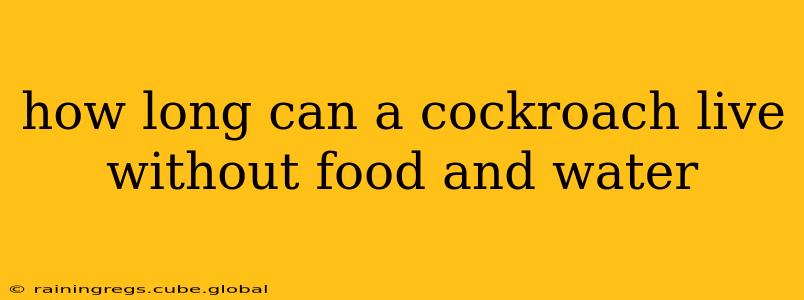Cockroaches, those ubiquitous and often unwelcome houseguests, possess a remarkable ability to survive in harsh conditions. A key part of their survival strategy lies in their impressive resilience to starvation and dehydration. But just how long can these resilient insects endure without food and water? The answer, unfortunately for those battling infestations, is surprisingly long.
How Long Can a Cockroach Live Without Food?
A cockroach's lifespan without food depends significantly on several factors including the species, the cockroach's age, and the ambient temperature. Generally, however, a cockroach can survive for several weeks without consuming any food. Some species may even last a month or longer. This prolonged survival is due to their slow metabolism and ability to conserve energy. They can slow down their bodily functions to a crawl, entering a state of dormancy to extend their survival time.
However, it's important to note that while they can survive, prolonged lack of food will eventually weaken them, making them more vulnerable to disease and predators, and significantly impacting their reproductive capabilities.
How Long Can a Cockroach Live Without Water?
Water is even more crucial to a cockroach's survival than food. Without water, their bodily functions will quickly become impaired. While they can go without food for several weeks, the average cockroach can only survive for around a week without water. This is because water is essential for all their metabolic processes. Dehydration leads to a rapid decline in their health and functionality.
Again, environmental factors influence this lifespan. Higher temperatures will accelerate dehydration, reducing their survival time.
What Happens to a Cockroach When It's Starving or Dehydrated?
As food and water sources dwindle, cockroaches experience a noticeable decline in their activity levels. They become lethargic, weaker, and more susceptible to diseases. Dehydrated cockroaches will exhibit signs of desiccation, with their bodies becoming shriveled and brittle. Starving cockroaches will show significant weight loss and may become noticeably smaller. In both cases, their ability to reproduce diminishes significantly, and ultimately, prolonged deprivation will lead to death.
Can Cockroaches Survive Without Food AND Water?
The combined absence of both food and water dramatically shortens a cockroach's lifespan. They will likely perish within a week, sometimes even sooner. The lack of both necessitates extreme energy conservation, and their bodies simply cannot sustain themselves for extended periods under such duress.
What are the best ways to prevent cockroach infestations?
Preventing cockroach infestations hinges on eliminating their access to food, water, and shelter. This involves maintaining a clean and clutter-free environment, regularly cleaning up spills and crumbs, storing food in airtight containers, and repairing any leaks or plumbing issues that provide a water source. Regularly checking for cracks and gaps in walls and floors and sealing them will further limit their entry points into your home.
In conclusion, while cockroaches display impressive resilience, their survival without food and water is limited. While they can endure several weeks without food, they are significantly more vulnerable to dehydration. Preventing infestations by targeting their access to resources is the most effective long-term solution.
